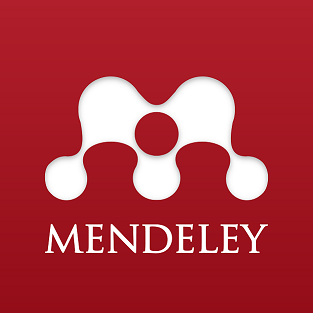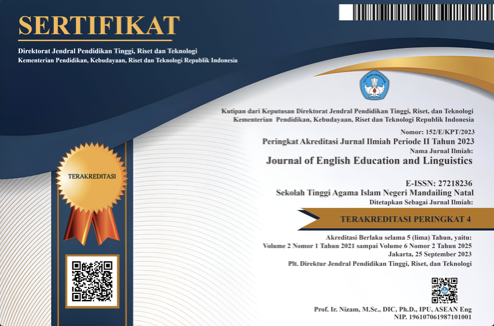AUTHENTIC ASSESSMENTS IN ENGLISH LANGUAGE TEACHING: A CASE IN SMP NEGERI 6 SEMARANG
DOI:
https://doi.org/10.56874/jeel.v2i1.409Keywords:
assessment; authentic assessment; English language teaching.Abstract
The Indonesian Ministry of Education and Culture published the 2013 Curriculum which demands teachers to apply authentic assessment as the method of assessing the students’ competence. Point to that, the implementation of authentic assessment as well as its washback should be investigated. For that reason, this study is trying to investigate: (1) authentic assessments applied in English teaching and learning, (2) the types of authentic assessment used, (3) the teachers’ difficulties in applying authentic assessment, (4) washback effect of the use of authentic assessment. This study applied qualitative design to capture the implementation of authentic assessment. Observation, documentation, questionnaire, and interview were carried out to get the data. The subject are English teachers and the students. The results showed that the authentic assessment applied in English teacher class of SMP N 6 Semarang, especially in eighth grade is in the level good. The teachers had applied authentic assessments in the teaching and learning process. The types of the authentic assessments were oral interview (in speaking test), story or text retelling (in speaking), writing sample (in writing test), and experiment or demonstration. Furthermore, relating to the washback of authentic assessment, it has been confirmed by the teachers that its implementation can improves the student’s English learning achievement. On the other hand, teachers also faced some difficulties in applying authentic assessment due to their lack of knowledge of authentic assessment.
References
Aksu Atac, B. (2012). Foreign language teachers' attitude toward authentic assessment in language teaching. Journal of Language and Linguistic Studies, 8(2), 7-19.
Al Fama, Y. A. A. M. (2015). The implementation of authentic assessment in teaching writing (Unpublished master’s thesis). Universitas Sebelas Maret Surakarta, Surakarta, Indonesia.
Aliningsih, F., & Sofwan, A. (2015). English teachers’ perceptions and practices of authentic assessment.Language Circle: Journal of Language and Literature, 10(1), 19-27.
Aristy, I., Hadiansyah, R., & Apsari, Y. (2019). Using Three Step-Interview To Improve
Student’s Speaking Ability.PROJECT (Professional Journal of English
Aziz, M. N. A., & Yusoff, N. M. (2018). Experiences of using Authentic Assessment with
English Language Young Learners. International Journal of Academic Research
in Business and Social Sciences, 8(9).
Cohen, Louis, Manion, L and Morrison K. (2007). Research method in education. New York: Rutledge
Darling-Hammond, L., & Snyder, J. (2000). Authentic assessment of teaching in
context. Teaching and teacher education, 16(5-6), 523-545.
of authentic assessment. The High School Journal, 89(1), 57-62.
Fulcher, G., & Davidson, F. (2007). Language testing and assessment. Routledge.
Hasriani, G. (2019). Interview as a learning technique in speaking subject: Students’
perspective. Language Circle: Journal of Language and Literature, 13(2).
Herrington, J., & Herrington, A. (2006). Authentic conditions for authentic assessment:
Aligning task and assessment.
Hijriati, H. (2014). Authentic Assessment and the Implication to Students’ Self-Esteem
in Teaching English at Senior High School. In Proceedings: The 61th TEFLIN
International Conference, UNS Solo.
Idham, F. I. (2015). The use of authentic assessment in English writing skill to the
eleventh grade students.E-Journal of ELTS (English Language Teaching
Society), 3(1).
Kinay, I., & Bagçeci, B. (2016). The Investigation of the Effects of Authentic Assessment
Approach on Prospective Teachers' Problem-Solving Skills. International
Education Studies, 9(8), 51-59.
Kothari, C. R. (2004). Research methodology: Methods and techniques. New Age
International.
Maca, S. (2020). Teaching English Speaking Skill through Pair and Group Interview
Techniques. Ethical Lingua: Journal of Language Teaching and
Literature, 7(2), 329-337.
Marhaeni, A. A. I. N., & Dantes, N. (2014). Toward Authentic Language Assessment: A
Case in Indonesian EFL Classrooms. In The European Conference on Language
Learning (pp. 1-15).
Mbeh, A. T. (2017). Impromptu speaking and authentic assessment in English language
teaching/learning. International Journal of New Technology and Research, 3(3),
-16.
Murphy, V., Fox, J., Freeman, S., & Hughes, N. (2017). “Keeping it Real”: A review of
the benefits, challenges and steps towards implementing authentic
assessment. All Ireland Journal of Higher Education, 9(3).
Pantiwati, Y. (2013). Authentic assessment for improving cognitive skill, critical-creative
thinking and meta-cognitive awareness.Journal of Education and
Practice, 4(14), 1-9.
Rennert-Ariev, P. (2005). A theoretical model for the authentic assessment of
teaching. Practical Assessment, Research, and Evaluation, 10(1), 2.
Tashakkori, A., & Creswell, J. W. (2007). The new era of mixed methods.
Trisanti, N. (2014). English teacher’s perspective on authentic assessment implementation of curriculum. Proceedings of the 61st TEFLIN International Conference 2014. Sebelas Maret University Press, Surakarta, Indonesia.
Downloads
Published
Issue
Section
License
All articles published in the Journal of English Education and Linguistics are licensed under a Creative Commons Attribution-ShareAlike 4.0 International (CC BY-SA) license. This means anyone is free to copy, transform, or redistribute articles for any lawful purpose in any medium, provided they give appropriate attribution to the original author(s) and Journal of English Education and Linguistics, link to the license, indicate if changes were made, and redistribute any derivative work under the same license.
Copyright on articles is retained by the respective author(s) without restrictions. A non-exclusive license is granted to the Journal of English Education and Linguistics to publish the article and identify itself as its original publisher, along with the commercial right to include the article in a hardcopy issue for sale to libraries and individuals.
Although the conditions of the Creative Commons Attribution-ShareAlike 4.0 International (CC BY-SA) license do not apply to authors (as the copyright holder of your article, you have no restrictions on your rights), by submitting to the Journal of English Education and Linguistics, authors recognize the rights of readers and must grant any third party the right to use their articles to the extent provided by the license.

This work is licensed under a Creative Commons Attribution-ShareAlike 4.0 International License.








